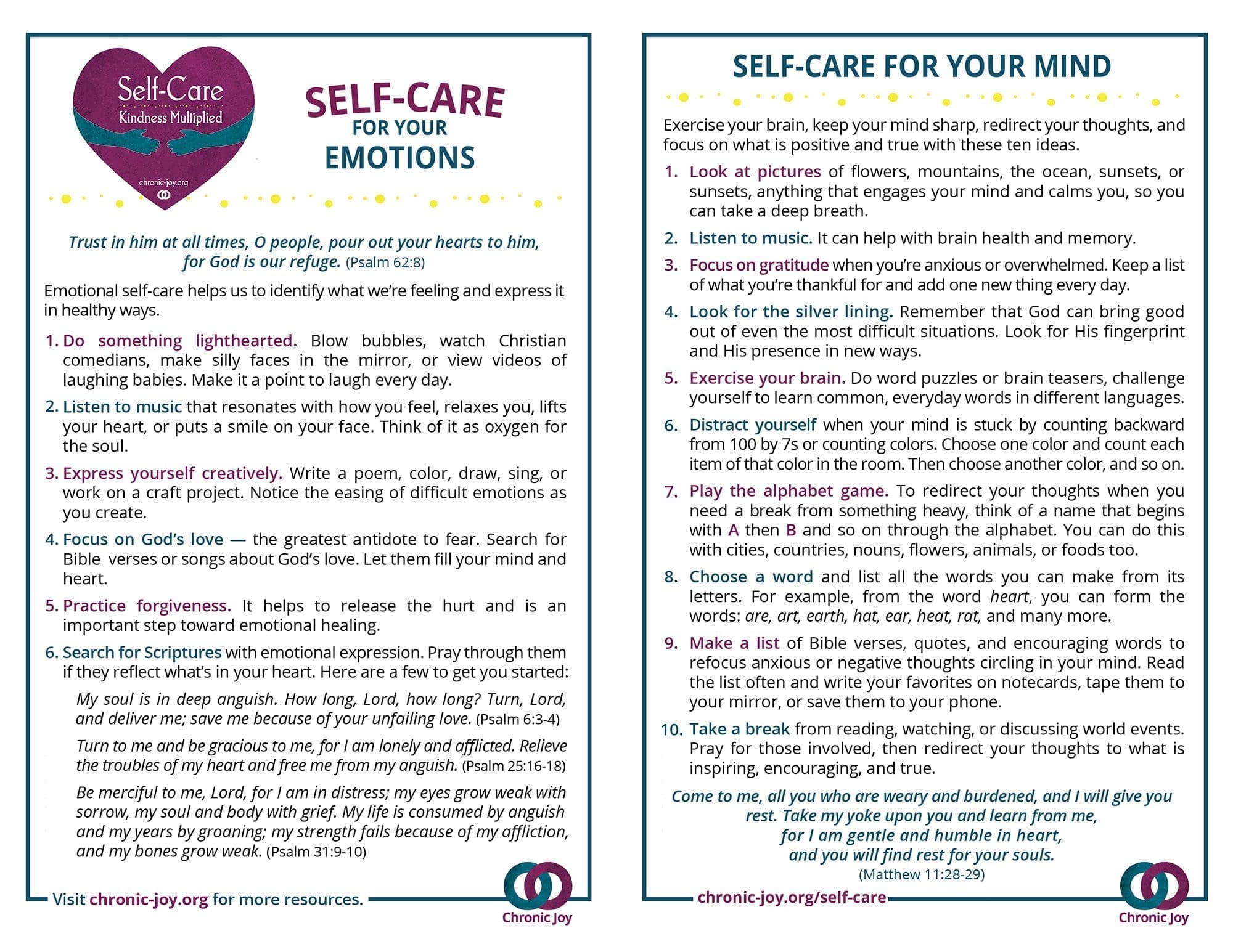
Trust in him at all times, you people, pour out your hearts to him, for God is our refuge. (Psalm 62:8)
DEALING WITH EMOTIONS
You’ve likely experienced a myriad of emotions related to being stricken with a chronic illness. That’s only natural since it’s a lot to face. Please know that there is no right or wrong way to feel about getting sick – but what do you do to tend to those emotions? Do you find healthy outlets for them or do you feel so overwhelmed that you keep them locked inside? It’s understandable if you aren’t sure how to process everything you feel or if you aren’t sure that you even want to try – but read on to see why it’s best to address your emotions.
WHY IT’S IMPORTANT TO DEAL WITH YOUR EMOTIONS
- MAKE ROOM FOR POSITIVE FEELINGS
When you shut off your emotions, you not only suppress negative feelings, but you also deny yourself positive ones. By avoiding what’s difficult, you not only prevent yourself from healing, but you also rob yourself of many good feelings. By learning to deal with the harder emotions, you can open your heart to happier and more peaceful sentiments. - BURIED EMOTIONS DON’T JUST DISAPPEAR
Stuffing feelings down is like sealing in hurt. Even though it may be painful at first, letting them out will eventually diminish them and their effects on you. Think of it as a path toward healing. This may be a long process, but it’s ultimately rewarding. - PENT-UP EMOTIONS MAY CAUSE YOU TO OVERREACT
You might wonder why you have had such a strong emotional response over something minor. It rises out of piled-up, unexpressed feelings. You’re reacting not only to the current circumstance but also to past, similar situations. It may seem that stuffing feelings is a way to control them, but in reality, they’ll ultimately control you. Those buried emotions can surface and come out in destructive ways. In time, as you let things out routinely, you won’t have that build-up that erupts at inopportune times. - OPEN YOUR HEART TO THE LORD
When you’re honest with yourself and God about your feelings, you invite His comfort and healing as well as His guidance to find your way forward.
THINGS TO REMEMBER ABOUT EMOTIONS
As you realize why it’s important to address your feelings and want to find your way forward, keep the following insights in mind.
- IT’S OKAY TO FEEL
Emotions don’t make you weak; they make you human. It’s okay, and even healthy, to feel. “Jesus wept” (John 11:35). If even the Savior of the world can cry, so can you. - ACCEPT YOUR EMOTIONS FOR WHAT THEY ARE
There’s no need to feel guilty, ashamed, or embarrassed. Feelings are feelings, and whatever you feel isn’t a matter of right or wrong. It’s a matter of learning what to do with your emotions. - EMOTIONS COME AND GO
As deep as they go and as permanent as they seem, feelings can change. They won’t necessarily always hold you in their grasp. - FEELINGS DON’T HAVE TO BE SCARY
They can feel more and more frightening the longer you keep them inside. In time, however, you can learn to manage your emotions so they don’t feel as scary anymore. -
LEARN TO IDENTIFY YOUR EMOTIONS
Try to be specific about what you’re feeling. You may say you feel bad, and that’s a great start. From there, try to zero in on it if you can. For example, you might feel sad because of a loss, disappointed because something didn’t work out as you expected, or abandoned by someone you thought would be there for you but wasn’t. You may find the Emotions Wheel helpful when you’re trying to pinpoint what you’re feeling.
- START FROM A PLACE OF HONESTY
Be honest with yourself and with God about how you feel. He sees your heart anyway, and He also understands why you feel as you do. With your heart open before Him, you’re allowing Him to comfort you, heal you, and lead you forward. - FIND HEALTHY WAYS TO EXPRESS YOUR FEELINGS
Whether it’s doing something lighthearted and silly, expressing yourself creatively, punching a pillow, writing in a journal, reciting some verses in Psalms as prayers, or getting help to work through painful emotions, you can benefit from releasing your feelings. See Self-Care for the Emotions and Mind for suggestions to help you get started.
IN CONCLUSION
If you aren’t used to dealing with your feelings, be patient with yourself as you discover what works best for you, and take it one step at a time. Start by being honest with yourself about how you feel. From there, you can learn healthy ways to express your feelings. If it seems overwhelming, it’s okay to reach out for help and support. This is a process, and you don’t have to navigate it alone – and remember that the Lord understands you better than anyone. You can take your feelings to Him and rest in His healing presence.
AN INVITATION
Check out the resources below to find ways to identify and express your emotions. Using the printable Self-Care for the Emotions and Mind, choose one or two suggestions to practice this week.


Laurie Glass
Chronic Joy® Staff Writer
Laurie has a Master's Degree in Christian Counseling and is the author of Coping with ME/CFS. Many of her poems and articles have been published in print and online. She won the Open Medicine Foundation poetry contest in 2019. Laurie loves to use her gift of writing to encourage others. Her book is available on Amazon.

Self-Care for your Emotions & Mind
Exercise your brain, keep your mind sharp, redirect your thoughts, and focus on what is positive and true with these ideas. Emotional self-care helps us identify what we’re feeling and how to express it in healthy ways.

Recent Comments